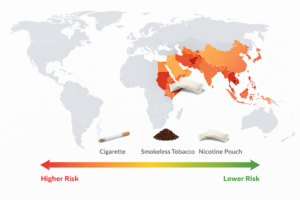The House of Representatives and the Senate of the Philippines approved on third Reading the Vaporized Nicotine Product Bill to regulate the manufacture, sale and use of e-cigarettes and heated tobacco products.
In less than three years, the Philippines, a small nation in the Pacific Ocean, turned from a restrictive approach toward smoking and vaping to approving a law that acknowledges the role of low risk products as a choice that can increase the chance of smoking cessation.
The decision represents a historic step for those committed in reducing the number of smoking-related deaths in the Asia continent: according to the latest statistics, about half of the male smokers in the world lives in Asia, especially in China, but also in India and Indonesia.
Only in the Philippines, smoking related diseases cause the death of about 100000 people, where 17.3 million adults use tobacco.
All 79 CoEHAR researchers expressed their support to government decision through a letter sent to the President of thePhilippines, in which we read “harm reduction in the context of tobacco control is a key instrument for disease prevention. There are preventable cancer and cardiopulmonary deaths, due to the underutilization of tobacco harm reduction strategies”.
Thanks to the VNP bill, the Philippines joined the rank of the most progressive countries in the field of harm reduction, such as England and New Zealand, countries that adopted alternative strategies to help smokers who can’t quit.Recently, the FDA authorized both e-cigarette products as well as heated tobacco products as “appropriate for the protection of public health.”
As we read in the letter “the U.S. FDA review considered the risks and benefits to the population. This includes how the products may impact youth use of nicotine and tobacco, and the potential for the products to completely move adult smokers away from use of combustible cigarettes”.
Regulation in the field is required also to prevent youth use: regarding the impact of vaping, these products need to be regulated to minimize risk, even if minimal, as declared by some experts of the Society for Research on Nicotine and Tobacco, who stated that “the large majority of nontobacco product‒using young people do not vape and, thus, have no nicotine exposure and among those who vape, most do so infrequently; many are short-term experimenters”.
Evidence from the latest study by CoEHAR underlined the role of vaping not only as a smoking cessation tool, but also to consistently improve respiratory symptoms, quality of life and rate of disease exacerbations in patient with specific diseases.
The VNP Bill is expect to reduce the number of smokers in the country, but above all it is an incredible public health opportunity that underlines the potential of vaping products to help adult smokers to quit or reduce the harm.




